Applying the National Recovery Framework to Jeremy Oxley's Case
VerifiedAdded on 2019/11/12
|8
|1910
|305
Report
AI Summary
The article discusses Jeremy Oxley's journey with schizophrenia, from initial phases before diagnosis to eventual recovery. The National Recovery Framework and its operational principles, including support, service delivery, and recovery processes, are highlighted as crucial factors in his success. His supportive family, friends, and fan base also played a significant role. The article concludes that the framework and supporting environment can lead to positive outcomes for individuals with mental illnesses.
Contribute Materials
Your contribution can guide someone’s learning journey. Share your
documents today.
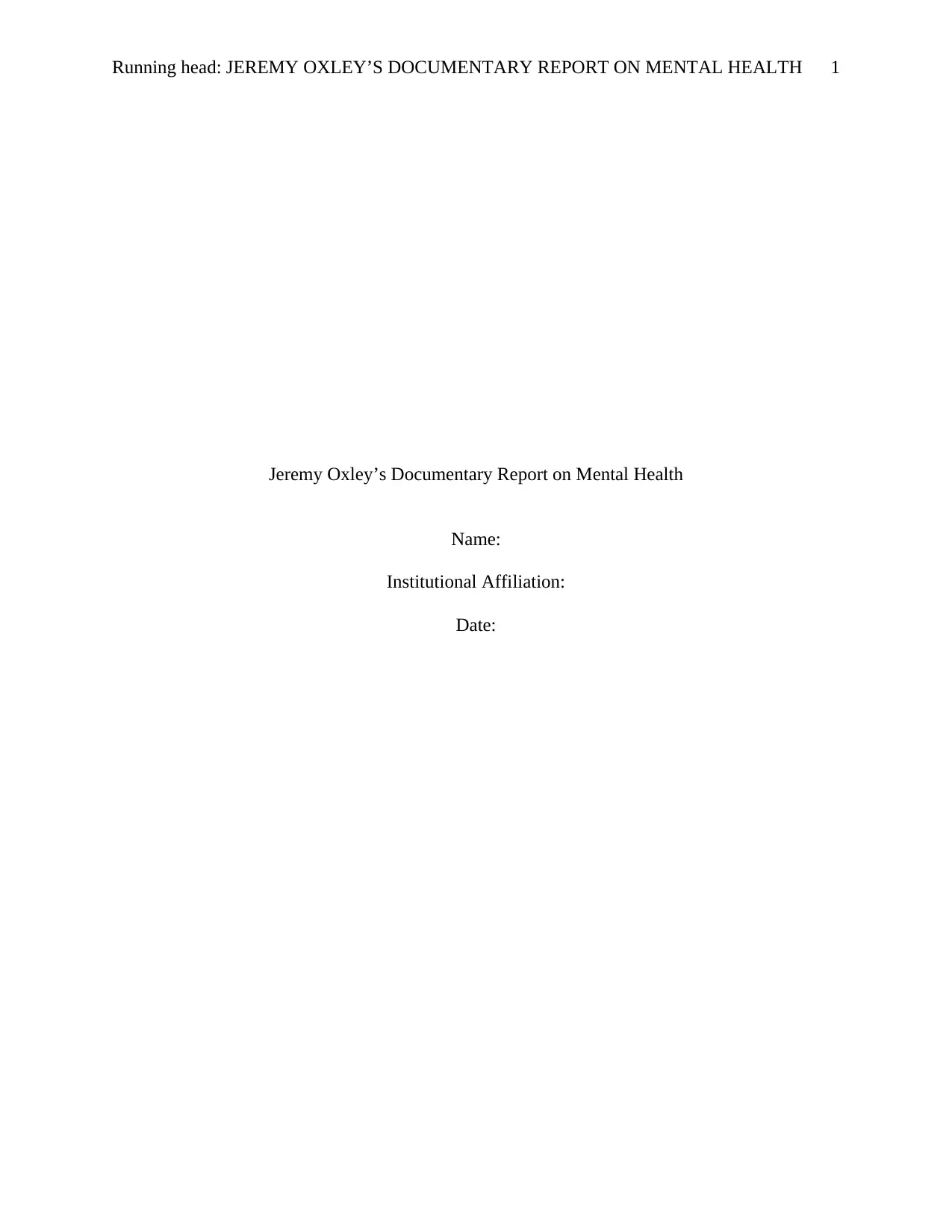
Running head: JEREMY OXLEY’S DOCUMENTARY REPORT ON MENTAL HEALTH 1
Jeremy Oxley’s Documentary Report on Mental Health
Name:
Institutional Affiliation:
Date:
Jeremy Oxley’s Documentary Report on Mental Health
Name:
Institutional Affiliation:
Date:
Secure Best Marks with AI Grader
Need help grading? Try our AI Grader for instant feedback on your assignments.
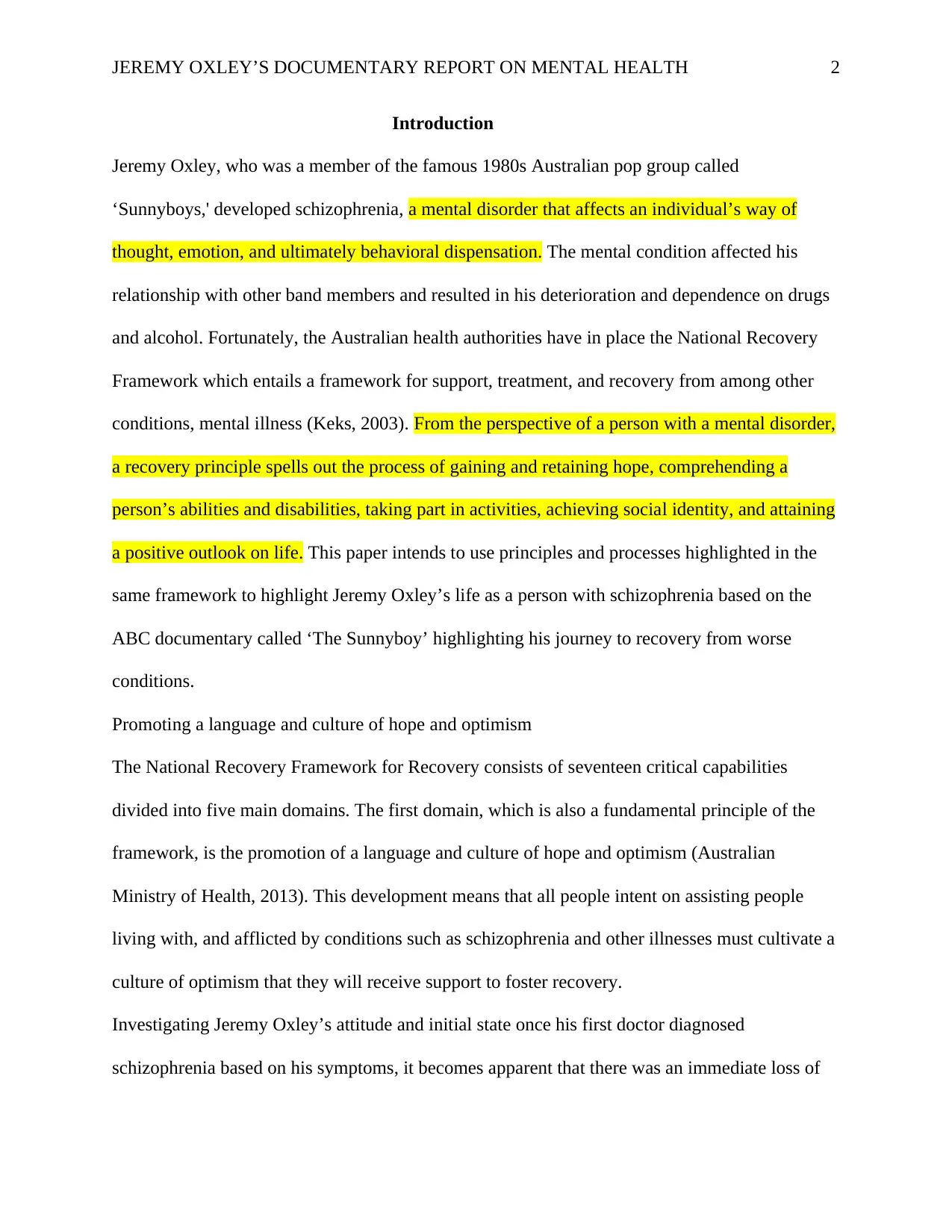
JEREMY OXLEY’S DOCUMENTARY REPORT ON MENTAL HEALTH 2
Introduction
Jeremy Oxley, who was a member of the famous 1980s Australian pop group called
‘Sunnyboys,' developed schizophrenia, a mental disorder that affects an individual’s way of
thought, emotion, and ultimately behavioral dispensation. The mental condition affected his
relationship with other band members and resulted in his deterioration and dependence on drugs
and alcohol. Fortunately, the Australian health authorities have in place the National Recovery
Framework which entails a framework for support, treatment, and recovery from among other
conditions, mental illness (Keks, 2003). From the perspective of a person with a mental disorder,
a recovery principle spells out the process of gaining and retaining hope, comprehending a
person’s abilities and disabilities, taking part in activities, achieving social identity, and attaining
a positive outlook on life. This paper intends to use principles and processes highlighted in the
same framework to highlight Jeremy Oxley’s life as a person with schizophrenia based on the
ABC documentary called ‘The Sunnyboy’ highlighting his journey to recovery from worse
conditions.
Promoting a language and culture of hope and optimism
The National Recovery Framework for Recovery consists of seventeen critical capabilities
divided into five main domains. The first domain, which is also a fundamental principle of the
framework, is the promotion of a language and culture of hope and optimism (Australian
Ministry of Health, 2013). This development means that all people intent on assisting people
living with, and afflicted by conditions such as schizophrenia and other illnesses must cultivate a
culture of optimism that they will receive support to foster recovery.
Investigating Jeremy Oxley’s attitude and initial state once his first doctor diagnosed
schizophrenia based on his symptoms, it becomes apparent that there was an immediate loss of
Introduction
Jeremy Oxley, who was a member of the famous 1980s Australian pop group called
‘Sunnyboys,' developed schizophrenia, a mental disorder that affects an individual’s way of
thought, emotion, and ultimately behavioral dispensation. The mental condition affected his
relationship with other band members and resulted in his deterioration and dependence on drugs
and alcohol. Fortunately, the Australian health authorities have in place the National Recovery
Framework which entails a framework for support, treatment, and recovery from among other
conditions, mental illness (Keks, 2003). From the perspective of a person with a mental disorder,
a recovery principle spells out the process of gaining and retaining hope, comprehending a
person’s abilities and disabilities, taking part in activities, achieving social identity, and attaining
a positive outlook on life. This paper intends to use principles and processes highlighted in the
same framework to highlight Jeremy Oxley’s life as a person with schizophrenia based on the
ABC documentary called ‘The Sunnyboy’ highlighting his journey to recovery from worse
conditions.
Promoting a language and culture of hope and optimism
The National Recovery Framework for Recovery consists of seventeen critical capabilities
divided into five main domains. The first domain, which is also a fundamental principle of the
framework, is the promotion of a language and culture of hope and optimism (Australian
Ministry of Health, 2013). This development means that all people intent on assisting people
living with, and afflicted by conditions such as schizophrenia and other illnesses must cultivate a
culture of optimism that they will receive support to foster recovery.
Investigating Jeremy Oxley’s attitude and initial state once his first doctor diagnosed
schizophrenia based on his symptoms, it becomes apparent that there was an immediate loss of
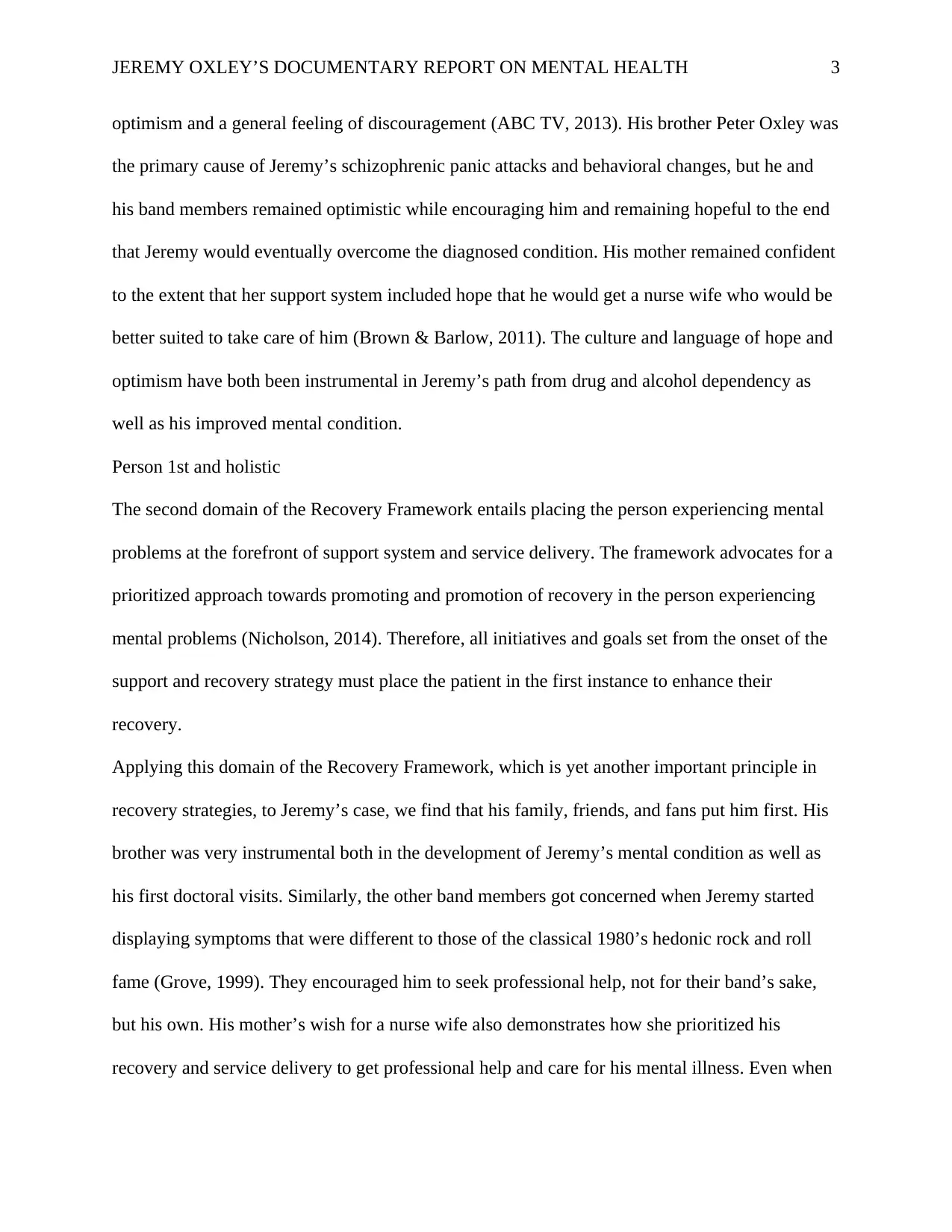
JEREMY OXLEY’S DOCUMENTARY REPORT ON MENTAL HEALTH 3
optimism and a general feeling of discouragement (ABC TV, 2013). His brother Peter Oxley was
the primary cause of Jeremy’s schizophrenic panic attacks and behavioral changes, but he and
his band members remained optimistic while encouraging him and remaining hopeful to the end
that Jeremy would eventually overcome the diagnosed condition. His mother remained confident
to the extent that her support system included hope that he would get a nurse wife who would be
better suited to take care of him (Brown & Barlow, 2011). The culture and language of hope and
optimism have both been instrumental in Jeremy’s path from drug and alcohol dependency as
well as his improved mental condition.
Person 1st and holistic
The second domain of the Recovery Framework entails placing the person experiencing mental
problems at the forefront of support system and service delivery. The framework advocates for a
prioritized approach towards promoting and promotion of recovery in the person experiencing
mental problems (Nicholson, 2014). Therefore, all initiatives and goals set from the onset of the
support and recovery strategy must place the patient in the first instance to enhance their
recovery.
Applying this domain of the Recovery Framework, which is yet another important principle in
recovery strategies, to Jeremy’s case, we find that his family, friends, and fans put him first. His
brother was very instrumental both in the development of Jeremy’s mental condition as well as
his first doctoral visits. Similarly, the other band members got concerned when Jeremy started
displaying symptoms that were different to those of the classical 1980’s hedonic rock and roll
fame (Grove, 1999). They encouraged him to seek professional help, not for their band’s sake,
but his own. His mother’s wish for a nurse wife also demonstrates how she prioritized his
recovery and service delivery to get professional help and care for his mental illness. Even when
optimism and a general feeling of discouragement (ABC TV, 2013). His brother Peter Oxley was
the primary cause of Jeremy’s schizophrenic panic attacks and behavioral changes, but he and
his band members remained optimistic while encouraging him and remaining hopeful to the end
that Jeremy would eventually overcome the diagnosed condition. His mother remained confident
to the extent that her support system included hope that he would get a nurse wife who would be
better suited to take care of him (Brown & Barlow, 2011). The culture and language of hope and
optimism have both been instrumental in Jeremy’s path from drug and alcohol dependency as
well as his improved mental condition.
Person 1st and holistic
The second domain of the Recovery Framework entails placing the person experiencing mental
problems at the forefront of support system and service delivery. The framework advocates for a
prioritized approach towards promoting and promotion of recovery in the person experiencing
mental problems (Nicholson, 2014). Therefore, all initiatives and goals set from the onset of the
support and recovery strategy must place the patient in the first instance to enhance their
recovery.
Applying this domain of the Recovery Framework, which is yet another important principle in
recovery strategies, to Jeremy’s case, we find that his family, friends, and fans put him first. His
brother was very instrumental both in the development of Jeremy’s mental condition as well as
his first doctoral visits. Similarly, the other band members got concerned when Jeremy started
displaying symptoms that were different to those of the classical 1980’s hedonic rock and roll
fame (Grove, 1999). They encouraged him to seek professional help, not for their band’s sake,
but his own. His mother’s wish for a nurse wife also demonstrates how she prioritized his
recovery and service delivery to get professional help and care for his mental illness. Even when
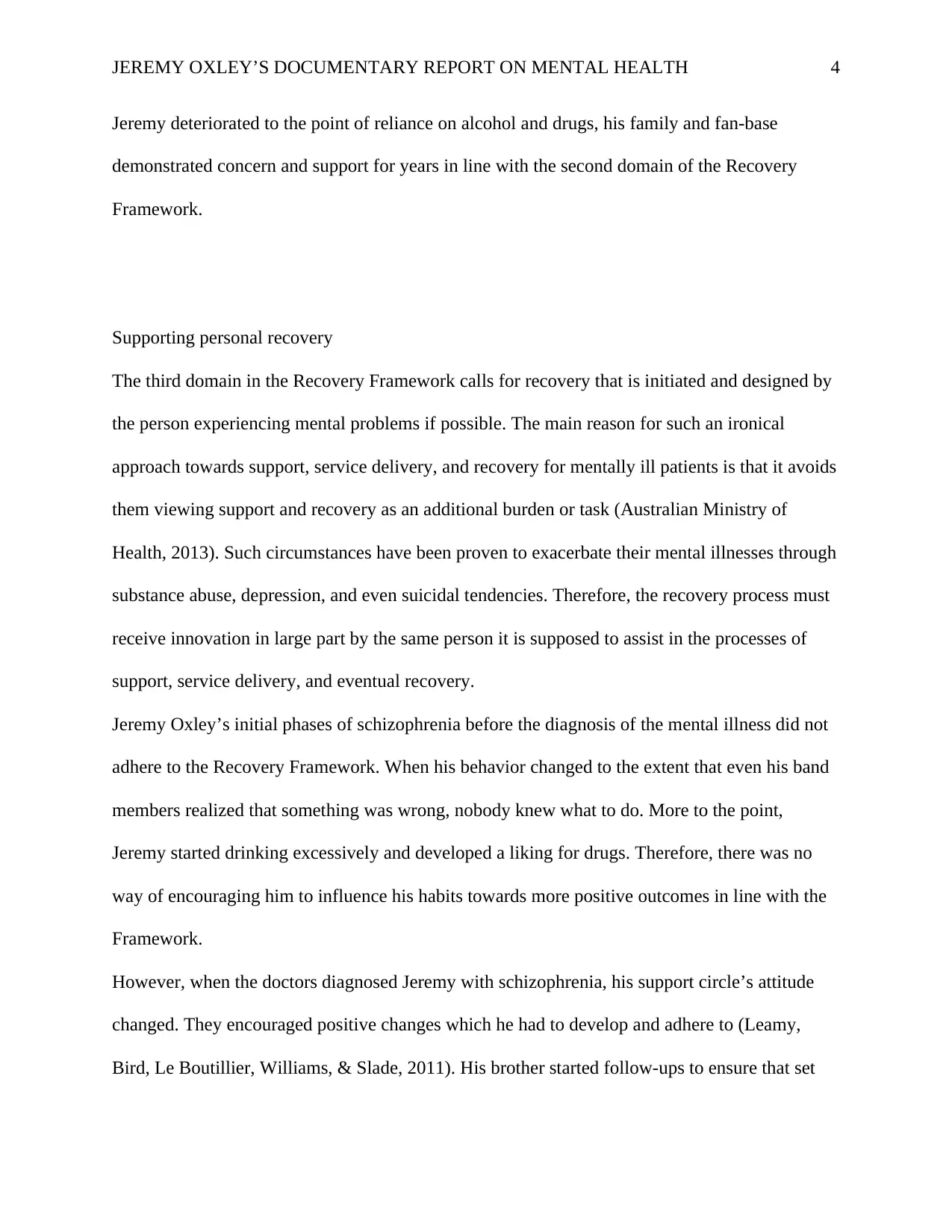
JEREMY OXLEY’S DOCUMENTARY REPORT ON MENTAL HEALTH 4
Jeremy deteriorated to the point of reliance on alcohol and drugs, his family and fan-base
demonstrated concern and support for years in line with the second domain of the Recovery
Framework.
Supporting personal recovery
The third domain in the Recovery Framework calls for recovery that is initiated and designed by
the person experiencing mental problems if possible. The main reason for such an ironical
approach towards support, service delivery, and recovery for mentally ill patients is that it avoids
them viewing support and recovery as an additional burden or task (Australian Ministry of
Health, 2013). Such circumstances have been proven to exacerbate their mental illnesses through
substance abuse, depression, and even suicidal tendencies. Therefore, the recovery process must
receive innovation in large part by the same person it is supposed to assist in the processes of
support, service delivery, and eventual recovery.
Jeremy Oxley’s initial phases of schizophrenia before the diagnosis of the mental illness did not
adhere to the Recovery Framework. When his behavior changed to the extent that even his band
members realized that something was wrong, nobody knew what to do. More to the point,
Jeremy started drinking excessively and developed a liking for drugs. Therefore, there was no
way of encouraging him to influence his habits towards more positive outcomes in line with the
Framework.
However, when the doctors diagnosed Jeremy with schizophrenia, his support circle’s attitude
changed. They encouraged positive changes which he had to develop and adhere to (Leamy,
Bird, Le Boutillier, Williams, & Slade, 2011). His brother started follow-ups to ensure that set
Jeremy deteriorated to the point of reliance on alcohol and drugs, his family and fan-base
demonstrated concern and support for years in line with the second domain of the Recovery
Framework.
Supporting personal recovery
The third domain in the Recovery Framework calls for recovery that is initiated and designed by
the person experiencing mental problems if possible. The main reason for such an ironical
approach towards support, service delivery, and recovery for mentally ill patients is that it avoids
them viewing support and recovery as an additional burden or task (Australian Ministry of
Health, 2013). Such circumstances have been proven to exacerbate their mental illnesses through
substance abuse, depression, and even suicidal tendencies. Therefore, the recovery process must
receive innovation in large part by the same person it is supposed to assist in the processes of
support, service delivery, and eventual recovery.
Jeremy Oxley’s initial phases of schizophrenia before the diagnosis of the mental illness did not
adhere to the Recovery Framework. When his behavior changed to the extent that even his band
members realized that something was wrong, nobody knew what to do. More to the point,
Jeremy started drinking excessively and developed a liking for drugs. Therefore, there was no
way of encouraging him to influence his habits towards more positive outcomes in line with the
Framework.
However, when the doctors diagnosed Jeremy with schizophrenia, his support circle’s attitude
changed. They encouraged positive changes which he had to develop and adhere to (Leamy,
Bird, Le Boutillier, Williams, & Slade, 2011). His brother started follow-ups to ensure that set
Secure Best Marks with AI Grader
Need help grading? Try our AI Grader for instant feedback on your assignments.
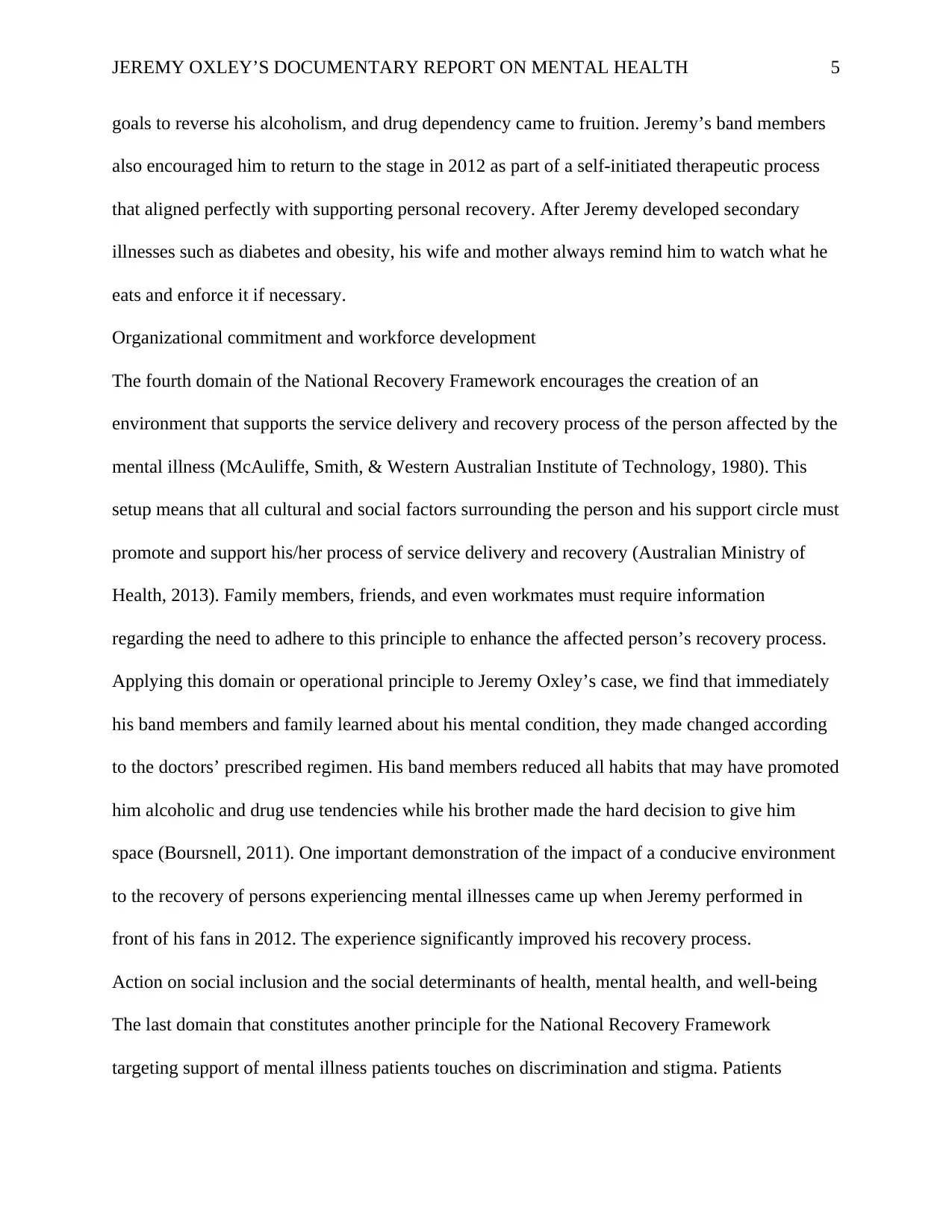
JEREMY OXLEY’S DOCUMENTARY REPORT ON MENTAL HEALTH 5
goals to reverse his alcoholism, and drug dependency came to fruition. Jeremy’s band members
also encouraged him to return to the stage in 2012 as part of a self-initiated therapeutic process
that aligned perfectly with supporting personal recovery. After Jeremy developed secondary
illnesses such as diabetes and obesity, his wife and mother always remind him to watch what he
eats and enforce it if necessary.
Organizational commitment and workforce development
The fourth domain of the National Recovery Framework encourages the creation of an
environment that supports the service delivery and recovery process of the person affected by the
mental illness (McAuliffe, Smith, & Western Australian Institute of Technology, 1980). This
setup means that all cultural and social factors surrounding the person and his support circle must
promote and support his/her process of service delivery and recovery (Australian Ministry of
Health, 2013). Family members, friends, and even workmates must require information
regarding the need to adhere to this principle to enhance the affected person’s recovery process.
Applying this domain or operational principle to Jeremy Oxley’s case, we find that immediately
his band members and family learned about his mental condition, they made changed according
to the doctors’ prescribed regimen. His band members reduced all habits that may have promoted
him alcoholic and drug use tendencies while his brother made the hard decision to give him
space (Boursnell, 2011). One important demonstration of the impact of a conducive environment
to the recovery of persons experiencing mental illnesses came up when Jeremy performed in
front of his fans in 2012. The experience significantly improved his recovery process.
Action on social inclusion and the social determinants of health, mental health, and well-being
The last domain that constitutes another principle for the National Recovery Framework
targeting support of mental illness patients touches on discrimination and stigma. Patients
goals to reverse his alcoholism, and drug dependency came to fruition. Jeremy’s band members
also encouraged him to return to the stage in 2012 as part of a self-initiated therapeutic process
that aligned perfectly with supporting personal recovery. After Jeremy developed secondary
illnesses such as diabetes and obesity, his wife and mother always remind him to watch what he
eats and enforce it if necessary.
Organizational commitment and workforce development
The fourth domain of the National Recovery Framework encourages the creation of an
environment that supports the service delivery and recovery process of the person affected by the
mental illness (McAuliffe, Smith, & Western Australian Institute of Technology, 1980). This
setup means that all cultural and social factors surrounding the person and his support circle must
promote and support his/her process of service delivery and recovery (Australian Ministry of
Health, 2013). Family members, friends, and even workmates must require information
regarding the need to adhere to this principle to enhance the affected person’s recovery process.
Applying this domain or operational principle to Jeremy Oxley’s case, we find that immediately
his band members and family learned about his mental condition, they made changed according
to the doctors’ prescribed regimen. His band members reduced all habits that may have promoted
him alcoholic and drug use tendencies while his brother made the hard decision to give him
space (Boursnell, 2011). One important demonstration of the impact of a conducive environment
to the recovery of persons experiencing mental illnesses came up when Jeremy performed in
front of his fans in 2012. The experience significantly improved his recovery process.
Action on social inclusion and the social determinants of health, mental health, and well-being
The last domain that constitutes another principle for the National Recovery Framework
targeting support of mental illness patients touches on discrimination and stigma. Patients
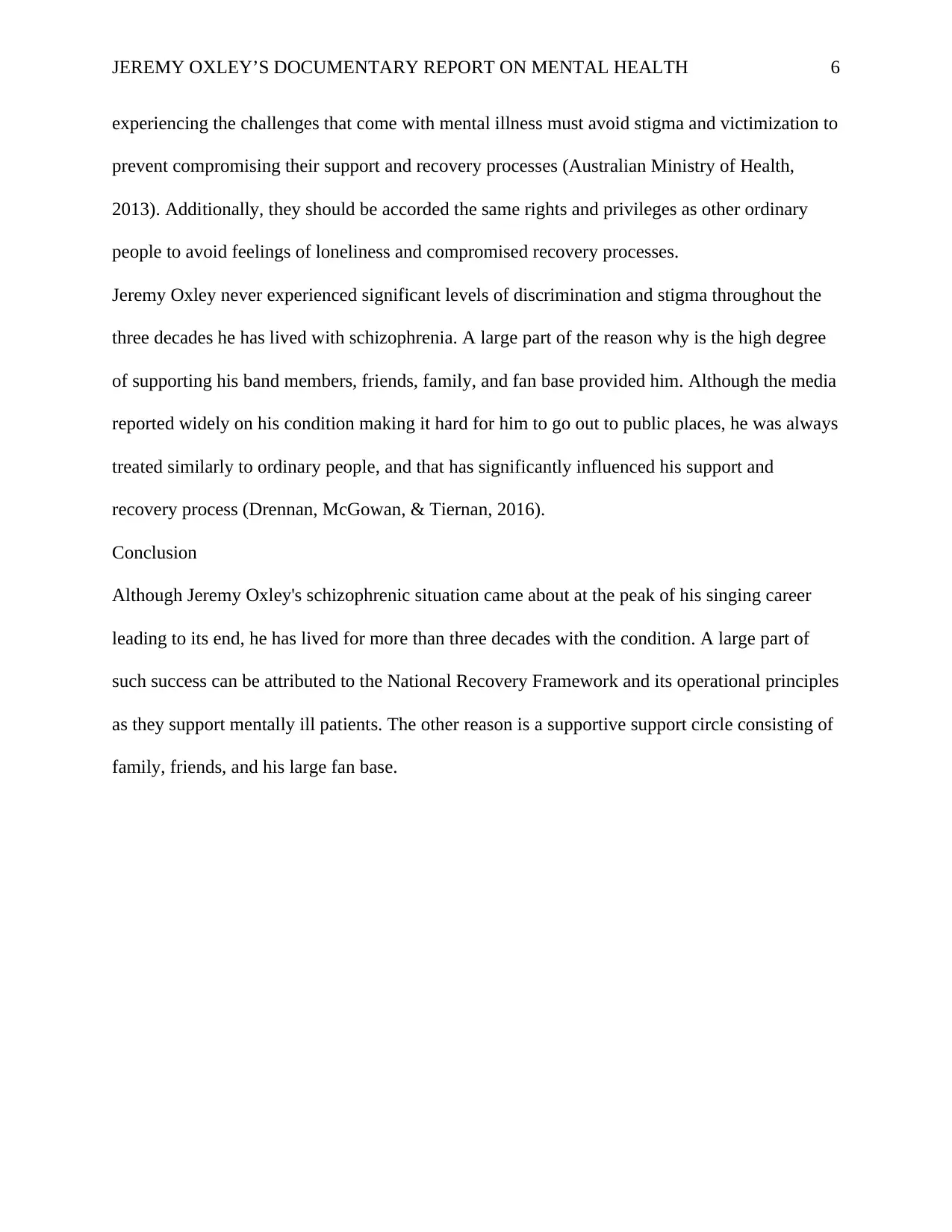
JEREMY OXLEY’S DOCUMENTARY REPORT ON MENTAL HEALTH 6
experiencing the challenges that come with mental illness must avoid stigma and victimization to
prevent compromising their support and recovery processes (Australian Ministry of Health,
2013). Additionally, they should be accorded the same rights and privileges as other ordinary
people to avoid feelings of loneliness and compromised recovery processes.
Jeremy Oxley never experienced significant levels of discrimination and stigma throughout the
three decades he has lived with schizophrenia. A large part of the reason why is the high degree
of supporting his band members, friends, family, and fan base provided him. Although the media
reported widely on his condition making it hard for him to go out to public places, he was always
treated similarly to ordinary people, and that has significantly influenced his support and
recovery process (Drennan, McGowan, & Tiernan, 2016).
Conclusion
Although Jeremy Oxley's schizophrenic situation came about at the peak of his singing career
leading to its end, he has lived for more than three decades with the condition. A large part of
such success can be attributed to the National Recovery Framework and its operational principles
as they support mentally ill patients. The other reason is a supportive support circle consisting of
family, friends, and his large fan base.
experiencing the challenges that come with mental illness must avoid stigma and victimization to
prevent compromising their support and recovery processes (Australian Ministry of Health,
2013). Additionally, they should be accorded the same rights and privileges as other ordinary
people to avoid feelings of loneliness and compromised recovery processes.
Jeremy Oxley never experienced significant levels of discrimination and stigma throughout the
three decades he has lived with schizophrenia. A large part of the reason why is the high degree
of supporting his band members, friends, family, and fan base provided him. Although the media
reported widely on his condition making it hard for him to go out to public places, he was always
treated similarly to ordinary people, and that has significantly influenced his support and
recovery process (Drennan, McGowan, & Tiernan, 2016).
Conclusion
Although Jeremy Oxley's schizophrenic situation came about at the peak of his singing career
leading to its end, he has lived for more than three decades with the condition. A large part of
such success can be attributed to the National Recovery Framework and its operational principles
as they support mentally ill patients. The other reason is a supportive support circle consisting of
family, friends, and his large fan base.
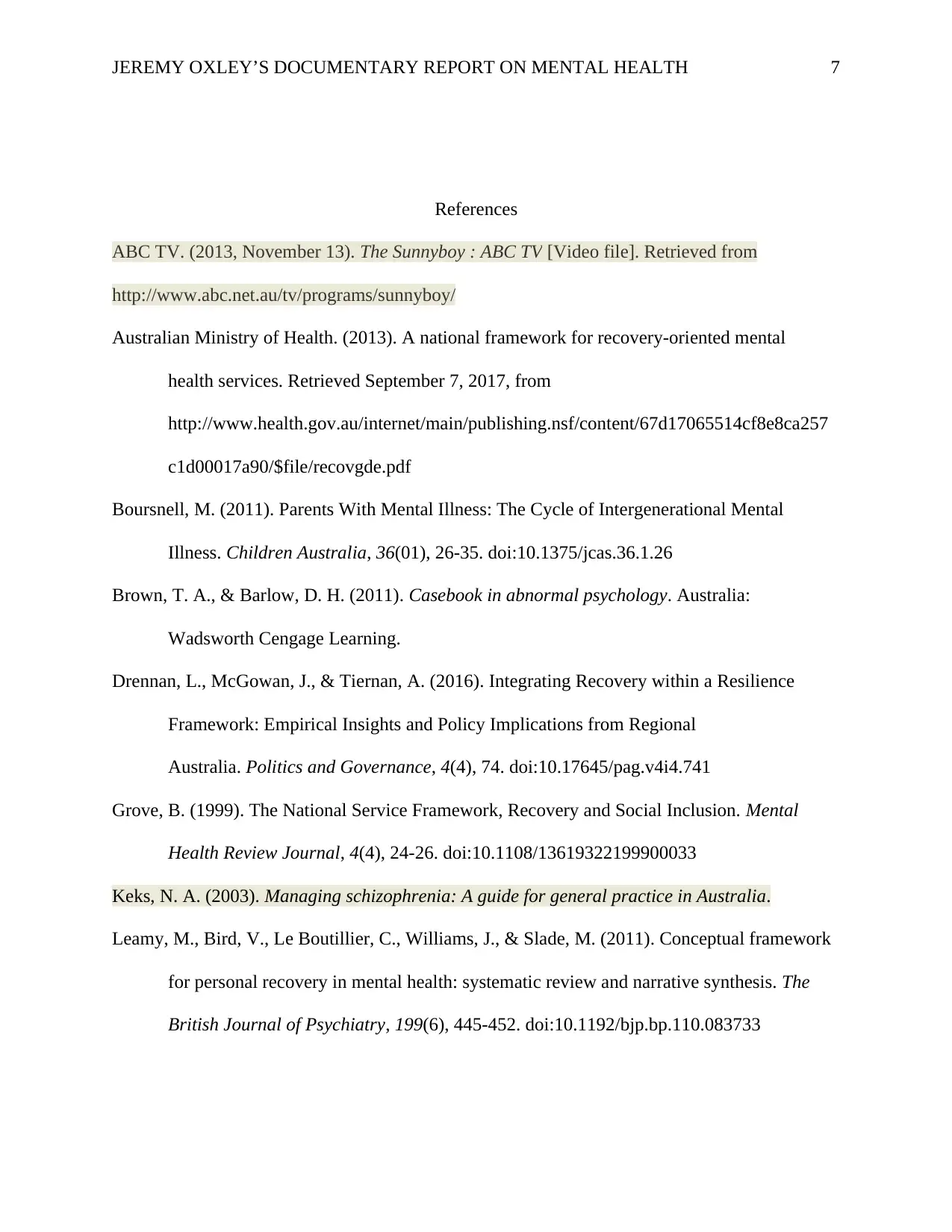
JEREMY OXLEY’S DOCUMENTARY REPORT ON MENTAL HEALTH 7
References
ABC TV. (2013, November 13). The Sunnyboy : ABC TV [Video file]. Retrieved from
http://www.abc.net.au/tv/programs/sunnyboy/
Australian Ministry of Health. (2013). A national framework for recovery-oriented mental
health services. Retrieved September 7, 2017, from
http://www.health.gov.au/internet/main/publishing.nsf/content/67d17065514cf8e8ca257
c1d00017a90/$file/recovgde.pdf
Boursnell, M. (2011). Parents With Mental Illness: The Cycle of Intergenerational Mental
Illness. Children Australia, 36(01), 26-35. doi:10.1375/jcas.36.1.26
Brown, T. A., & Barlow, D. H. (2011). Casebook in abnormal psychology. Australia:
Wadsworth Cengage Learning.
Drennan, L., McGowan, J., & Tiernan, A. (2016). Integrating Recovery within a Resilience
Framework: Empirical Insights and Policy Implications from Regional
Australia. Politics and Governance, 4(4), 74. doi:10.17645/pag.v4i4.741
Grove, B. (1999). The National Service Framework, Recovery and Social Inclusion. Mental
Health Review Journal, 4(4), 24-26. doi:10.1108/13619322199900033
Keks, N. A. (2003). Managing schizophrenia: A guide for general practice in Australia.
Leamy, M., Bird, V., Le Boutillier, C., Williams, J., & Slade, M. (2011). Conceptual framework
for personal recovery in mental health: systematic review and narrative synthesis. The
British Journal of Psychiatry, 199(6), 445-452. doi:10.1192/bjp.bp.110.083733
References
ABC TV. (2013, November 13). The Sunnyboy : ABC TV [Video file]. Retrieved from
http://www.abc.net.au/tv/programs/sunnyboy/
Australian Ministry of Health. (2013). A national framework for recovery-oriented mental
health services. Retrieved September 7, 2017, from
http://www.health.gov.au/internet/main/publishing.nsf/content/67d17065514cf8e8ca257
c1d00017a90/$file/recovgde.pdf
Boursnell, M. (2011). Parents With Mental Illness: The Cycle of Intergenerational Mental
Illness. Children Australia, 36(01), 26-35. doi:10.1375/jcas.36.1.26
Brown, T. A., & Barlow, D. H. (2011). Casebook in abnormal psychology. Australia:
Wadsworth Cengage Learning.
Drennan, L., McGowan, J., & Tiernan, A. (2016). Integrating Recovery within a Resilience
Framework: Empirical Insights and Policy Implications from Regional
Australia. Politics and Governance, 4(4), 74. doi:10.17645/pag.v4i4.741
Grove, B. (1999). The National Service Framework, Recovery and Social Inclusion. Mental
Health Review Journal, 4(4), 24-26. doi:10.1108/13619322199900033
Keks, N. A. (2003). Managing schizophrenia: A guide for general practice in Australia.
Leamy, M., Bird, V., Le Boutillier, C., Williams, J., & Slade, M. (2011). Conceptual framework
for personal recovery in mental health: systematic review and narrative synthesis. The
British Journal of Psychiatry, 199(6), 445-452. doi:10.1192/bjp.bp.110.083733
Paraphrase This Document
Need a fresh take? Get an instant paraphrase of this document with our AI Paraphraser
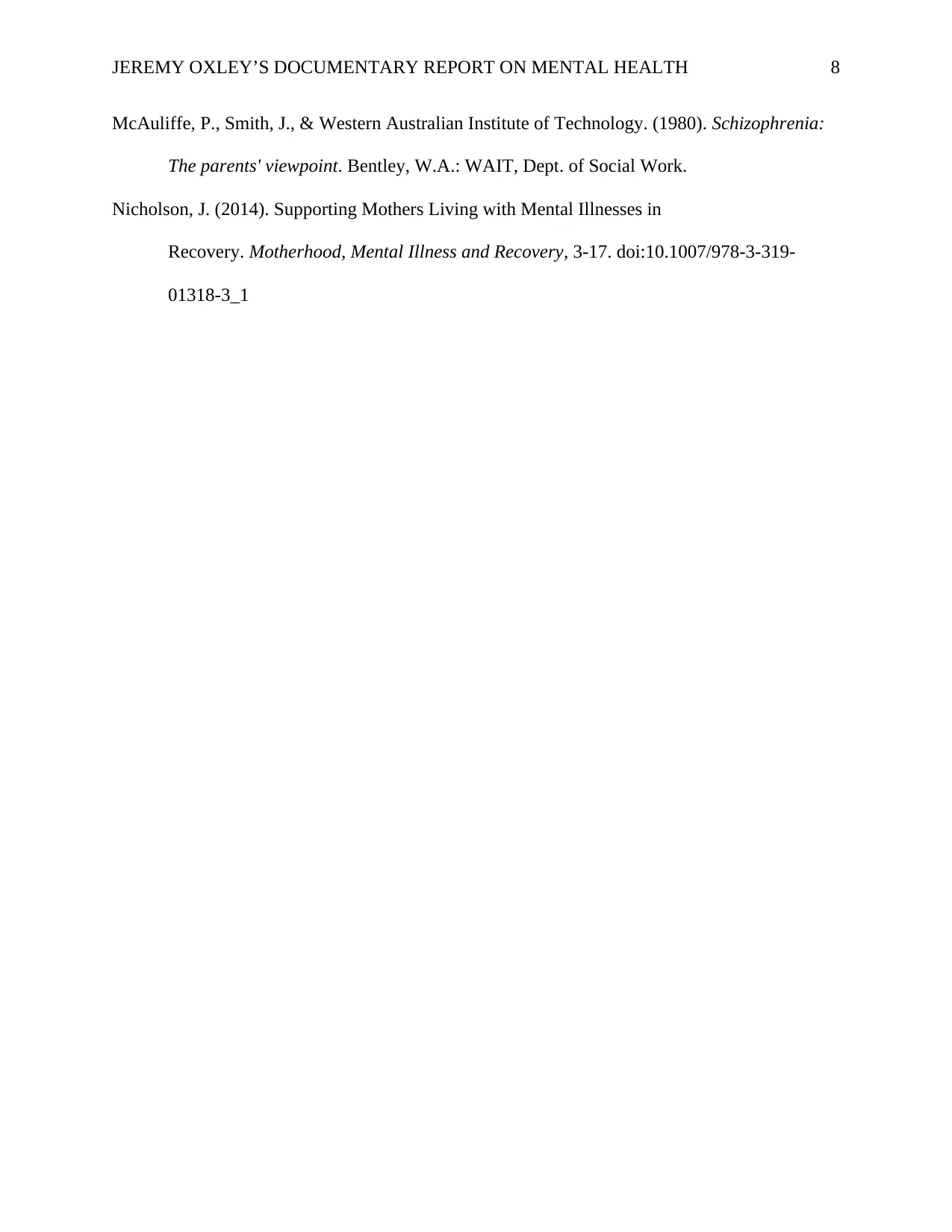
JEREMY OXLEY’S DOCUMENTARY REPORT ON MENTAL HEALTH 8
McAuliffe, P., Smith, J., & Western Australian Institute of Technology. (1980). Schizophrenia:
The parents' viewpoint. Bentley, W.A.: WAIT, Dept. of Social Work.
Nicholson, J. (2014). Supporting Mothers Living with Mental Illnesses in
Recovery. Motherhood, Mental Illness and Recovery, 3-17. doi:10.1007/978-3-319-
01318-3_1
McAuliffe, P., Smith, J., & Western Australian Institute of Technology. (1980). Schizophrenia:
The parents' viewpoint. Bentley, W.A.: WAIT, Dept. of Social Work.
Nicholson, J. (2014). Supporting Mothers Living with Mental Illnesses in
Recovery. Motherhood, Mental Illness and Recovery, 3-17. doi:10.1007/978-3-319-
01318-3_1
1 out of 8
Related Documents
Your All-in-One AI-Powered Toolkit for Academic Success.
+13062052269
info@desklib.com
Available 24*7 on WhatsApp / Email
![[object Object]](/_next/static/media/star-bottom.7253800d.svg)
Unlock your academic potential
© 2024 | Zucol Services PVT LTD | All rights reserved.





